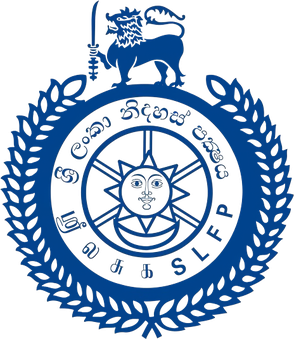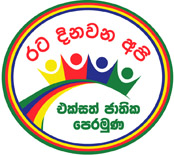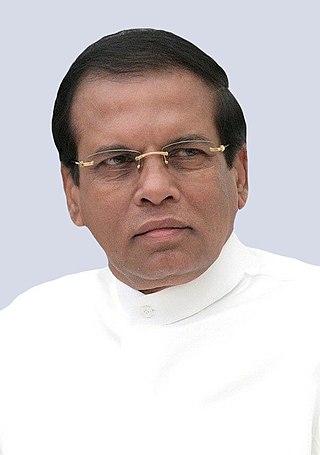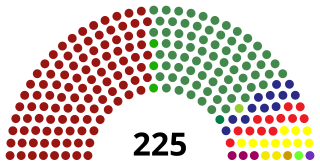Related Research Articles

The United National Party is a centre-right political party in Sri Lanka. The UNP has served as the country's ruling party, or as part of its governing coalition, for 38 of the country's 74 years of independence, including the periods 1947–1956, 1965–1970, 1977–1994, 2001–2004 and 2015–2019. The party also controlled the executive presidency from its formation in 1978 until 1994 and back in 2022.

Mahinda Rajapaksa is a Sri Lankan politician. He served as the President of Sri Lanka from 2005 to 2015; the Prime Minister of Sri Lanka from 2004 to 2005, 2018, and 2019 to 2022; the Leader of the Opposition from 2002 to 2004 and 2018 to 2019, and the Minister of Finance from 2005 to 2015 and 2019 to 2021. He has been a Member of Parliament (MP) for Kurunegala since 2015.

The Sri Lanka Freedom Party is one of the main political parties of Sri Lanka. It was founded by S. W. R. D. Bandaranaike in 1951 and has been one of the two largest parties in the Sri Lankan political arena since. It first came to power in 1956 and has served as the predominant ruling party on a number of occasions. It is currently the third largest party in the Parliament of Sri Lanka after the Sri Lanka Podujana Peramuna and the Samagi Jana Balawegaya.

The United National Front (UNF), later the United National Front for Good Governance (UNFGG), was a political alliance in Sri Lanka led by the United National Party.

Mangala Pinsiri Samaraweera was a Sri Lankan politician.

Nandasena Gotabaya Rajapaksa, is a former Sri Lankan politician and military officer, who served as the eighth President of Sri Lanka from 18 November 2019 until his resignation on 14 July 2022. He previously served as Secretary to the Ministry of Defence and Urban Development from 2005 to 2015 under the administration of his elder brother former President Mahinda Rajapaksa, during the final phase of the Sri Lankan Civil War.

Maithripala Yapa Sirisena is a Sri Lankan politician who served as the seventh President of Sri Lanka from 9 January 2015 to 18 November 2019. Sirisena is Sri Lanka's first president from the North Central Province of the country and does not belong to the traditional Sri Lankan political elite. He is currently a member of parliament from Polonnaruwa.

Bodu Bala Sena, also abbreviated as BBS is a far-right anti-liberalist, and ultranationalist Sinhalese Buddhist organization, and a break-away faction from the right-wing nationalist Jathika Hela Urumaya party. The BBS generally opposes pluralist and democratic ideologies, and criticizes non-extremist Buddhist monks for not taking action against the rise of other religions within Sri Lanka.
Ramesh Pathirana is a Sri Lankan politician, a member of the Parliament of Sri Lanka and is serving as the current Minister of Health. He previously served as the Minister of Plantation Industries, Minister of Industries and Minister of Education.He belongs to the Sri Lanka Podujana Peramuna. He was educated at Richmond College, Galle and University of Peradeniya. He is a physician by profession and is the son of former Education and Higher Education minister Richard Pathirana.

The Sri Lanka People's Front, commonly known by its Sinhalese name Sri Lanka Podujana Peramuna (SLPP), is a political party in Sri Lanka. It is the current ruling party in Sri Lanka. Previously a minor political party known as the Sri Lanka National Front (SLNF) and Our Sri Lanka Freedom Front (OSLFF), it was relaunched in 2016 as the SLPP and the party became the base for members of the United People's Freedom Alliance loyal to its former leader Mahinda Rajapaksa.

Siva Senai is a Hindu nationalist political group in Sri Lanka formed to protect the interests of Sri Lankan Tamil Hindus. The group was founded on 12 October 2016. Maravanpulavu Sachchithananthan, a former United Nations official, is the founder of the group, which has received encouragement from the Indian political party Shiv Sena. Siva Senai spearheaded an initiative in December 2017 to allow Sri Lankan pilgrims to visit Chidambaram in Tamil Nadu, India. The group has also actively advocated against cattle slaughter in Sri Lanka.

Parliamentary elections were held in Sri Lanka on 5 August 2020 to elect 225 members to Sri Lanka's 16th Parliament. 16,263,885 people were eligible to vote in the election, 31.95% of whom were young voters.

Presidential elections were held in Sri Lanka on 16 November 2019. Incumbent president Maithripala Sirisena did not run for a second term. Gotabaya Rajapaksa, brother of former president Mahinda Rajapaksa, was the candidate of the Sri Lanka Podujana Peramuna and was endorsed by the Sri Lanka Freedom Party. Sajith Premadasa, son of former president Ranasinghe Premadasa and deputy leader of the United National Party was the candidate of the ruling party.

The 16th Parliament of Sri Lanka is the current Parliament of Sri Lanka, with the membership determined by the results of the 2020 parliamentary election held on 5 August 2020. According to the Constitution of Sri Lanka the maximum legislative term of the parliament is 5 years from the first meeting.

Mohamed Uvais Mohamed Ali Sabry, PC, MP, also known as Ali Sabry, is a Sri Lankan lawyer and politician. He is the Current Minister of Foreign Affairs serving since 22 July 2022. He previously served as the Minister of Finance until 9 May 2022. He was a Member of Parliament, appointed from the national list of the Sri Lanka Podujana Peramuna. He also served as the Minister of Justice until 9 May 2022. He served as the defense counsel of President Gotabaya Rajapaksa, chief legal adviser and President of the Muslim Federation of the Sri Lanka Podujana Peramuna.

The 2022 Sri Lankan protests, commonly known as Aragalaya, were a series of mass protests that began in March 2022 against the government of Sri Lanka. The government was heavily criticized for mismanaging the Sri Lankan economy, which led to a subsequent economic crisis involving severe inflation, daily blackouts, and a shortage of fuel, domestic gas, and other essential goods. The protesters' main demand was the resignation of President Gotabaya Rajapaksa and key officials from the Rajapaksa family. Despite the involvement of several opposition parties, most protesters considered themselves to be apolitical, with many expressing discontent with the parliamentary opposition. Protesters chanted slogans such as "Go Home Gota", "Go Home Rajapaksas", and "Aragalayata Jaya Wewa". Most protests were organized by the general public, with youths playing a major part by carrying out protests at Galle Face Green.

The 2022 Sri Lankan political crisis was a political crisis in Sri Lanka due to the power struggle between President Gotabaya Rajapaksa and the people of Sri Lanka. It was fueled by the anti-government protests and demonstrations by the public due to the economic crisis in the country. The anti-government sentiment across various parts of Sri Lanka has triggered a state of political instability that is unprecedented in the nation's history.
Arukathu Patabendige Jagath Pushpakumara, commonly known as Jagath Pushpakumara, is a Sri Lankan politician and Member of Parliament.

The Uttara Lanka Sabhagaya or Supreme Lanka Coalition is a political alliance in Sri Lanka formed in 2022. The coalition is made up of seven Sri Lankan leftist and nationalist parties who were formerly part of the SLPP-led Sri Lanka People's Freedom Alliance, before defecting to the opposition amidst the 2022 economic crisis and political crisis. The first conference of the alliance was held on 4 September 2022. Leader of the National Freedom Front (NFF) and former cabinet minister Wimal Weerawansa is the chairman of the Supreme Lanka Coalition.

The Freedom People's Alliance was a political alliance in Sri Lanka founded in 2023. The alliance consisted of 12 political parties, including the Sri Lanka Freedom Party (SFLP), the Uttara Lanka Sabhagaya and the Freedom People's Congress.
References
- 1 2 "Why is Sri Lanka planning to ban cattle slaughter?". Why is Sri Lanka planning to ban cattle slaughter?. Retrieved 2020-09-11.
- ↑ "Govt. to ban cattle slaughter". dailymirror.lk. Retrieved 2020-09-11.
- ↑ "Sri Lanka bans cattle slaughter". outlookindia.com/. Retrieved 2020-09-29.
- ↑ "Cabinet approval to ban cattle slaughter in Sri Lanka". adaderana.lk. Retrieved 2020-09-29.
- ↑ Srinivasan, Meera (2020-09-29). "Sri Lanka bans cattle slaughter". The Hindu. ISSN 0971-751X . Retrieved 2020-10-01.
- 1 2 p.k.balachandran (10 September 2020). "The Intricacies of a Cow Slaughter Ban in Sri Lanka". The Citizen. Retrieved 2020-09-11.
- 1 2 "Mahinda Rajapaksa proposes ban on cattle slaughter". The Hindu. 2020-09-08. ISSN 0971-751X . Retrieved 2020-09-11.
- ↑ "Govt. considers banning cattle slaughter". Hiru News. Retrieved 2020-09-11.
- ↑ "Cattle slaughter to be banned in Sri Lanka - Beef imports to be allowed". NewsWire. 2020-09-08. Retrieved 2020-09-11.
- ↑ "SLPP approves proposal banning cow slaughter in Sri Lanka | Tamil Guardian". tamilguardian.com. Retrieved 2020-09-11.
- ↑ Mudugamuwa, Ishara. "Cattle slaughter ban postponed". Daily News. Retrieved 2020-09-11.
- ↑ "Sri Lanka : Introducing legislation to ban cattle slaughter postponed". colombopage.com. Retrieved 2020-09-11.
- ↑ "Sri Lanka bans cattle slaughter". The New Indian Express. 29 September 2020. Retrieved 2020-09-29.
- ↑ "Mike Pompeo due in Asia for talks on China, North Korea". The New Indian Express. 30 September 2020. Retrieved 2020-10-01.